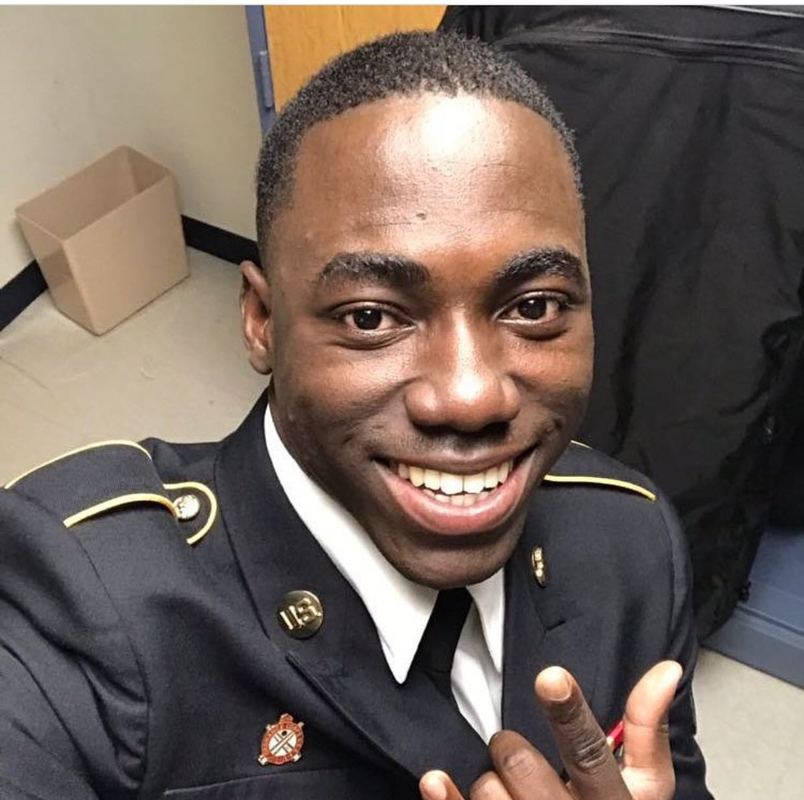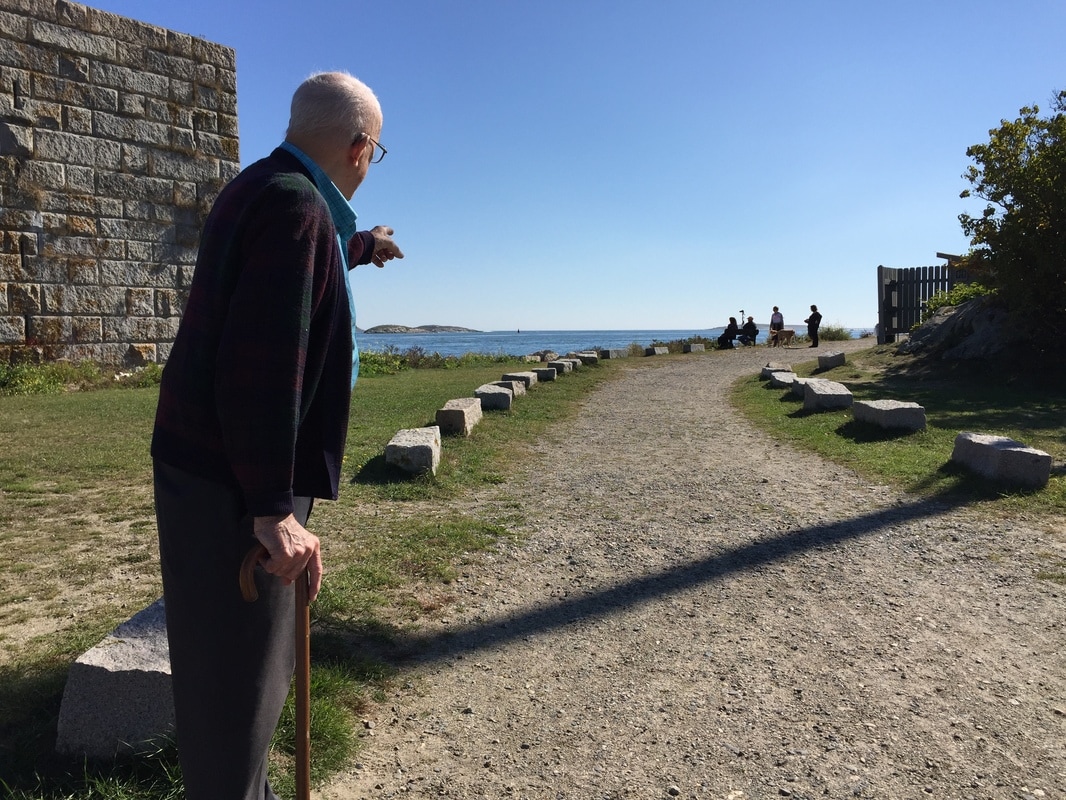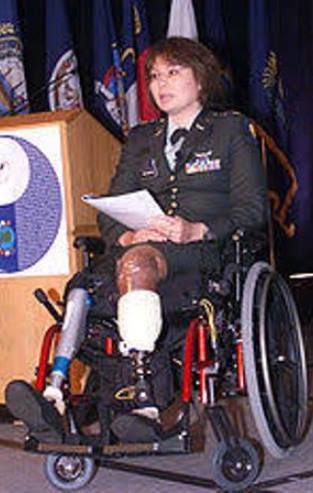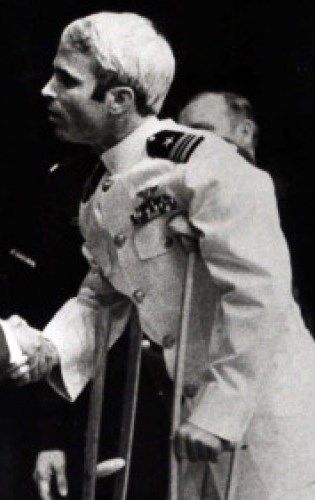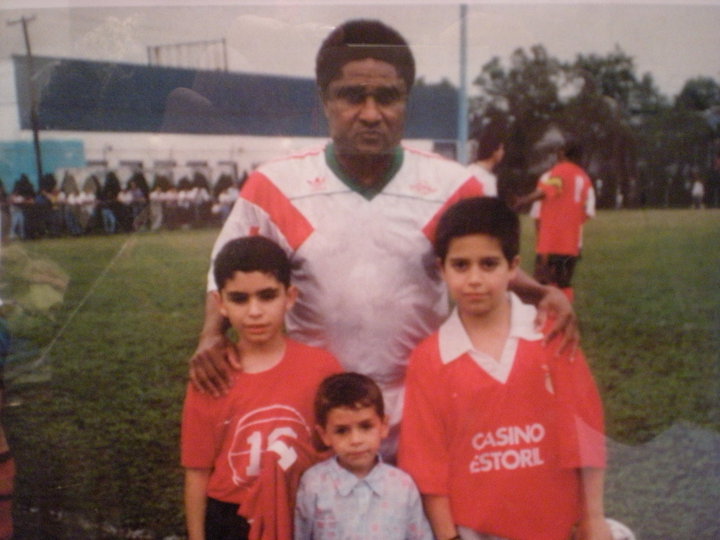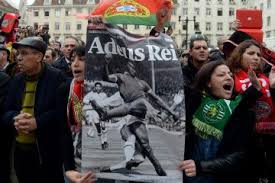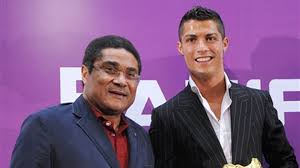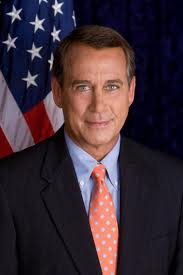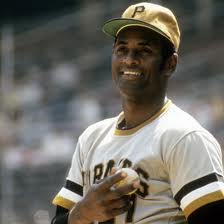|
(This is the way an American hero acts.) Some people become heroes once. John McCain was a hero four different ways, by my count. He was a hero in wartime and he was a hero during the stench of Donald Trump and Mitch McConnell. That is why I am celebrating the news that he has posthumously been awarded the Presidential Medal of Freedom. The medal is going to deserving people like --Sandra Lindsay, a nurse who lives in the same town I do, who became the first American to be inoculated against Covid. --Simone Biles, the Olympic champion who excelled despite being assaulted in one form or another by a rogue doctor, the gymnastics federation, and the FBI -- Megan Rapinoe, who caught my eye with her brazen sorties as a star soccer player, and then caught the eye of the world with her support of female athletes and LGBTQ causes. ---And so many others. John McCain touches my heart in a special way because he was a perpetual hero, and also a very human public figure. I met him once in his office in 1999, when we talked so easily during a break in a Senate investigation of the Olympic movement. (He had just savaged an American Olympic official who sounded too vague to the senator.) I began with a question about something else: my wife had sat next to one of McCain’s service buddies on a long flight to Asia. The man told her how the senator was quietly leading some vets to raise money and goods and shipping them to, yes, Vietnam – the same country that had broken his arms during a long and cruel captivity. In his office in 1999, I asked McCain why he helped Vietnam. His answer was an eloquent shrug with his damaged shoulders -- a gesture of modesty. John McCain was also a hero during his doomed campaign in 2008 when Republican voters vilified Sen. Barack Obama as “an Arab.” John McCain snatched the microphone back with the response that his fellow senator was a good man, a family man. McCain asserted that he would make a better president, but he told his own people that they need not worry about the loyalties of his opponent. That is the instinctive act of an American political hero. Or used to be. The fourth time John McCain was a hero was in 2017 when it was apparent he was dying of cancer. With a post-operative scar on his head, John McCain strode, military-like, to the floor of the Senate, where his colleagues were voting whether to scuttle much of the health-care program known as Obamacare. At 1:39 AM, John McCain faced the twisted Mitch McConnell and jabbed his right thumb downward, in a decisive gesture straight from the Roman Colosseum. No repeal. Ongoing health care for millions. That, for me, is the act of a hero. The recipients of the Medal of Freedom are always varied. I became interested in the medal in 2011 when Stan Musial, whose biography I was writing, was among the honorees. Through a Washington insider friend, I received a special guest pass, (more access than a journalist) and mingled with the guests and the recipients, including a fading Stan the Man. I watched President Obama appear, so knowing and enthused about each of the recipients and their fields. I got to chat with Bill Russell, still fierce-looking, and tell Yo-Yo Ma how much I admired his diverse cello repertoire On the way in, a Washington lawyer pal of mine was showing me a photo of himself with a very young President n 1961, and a handsome lady spotted the photo and said, “That’s my brother” – meaning President Kennedy. She was Jean Kennedy Smith, another recipient that day. After the ceremony, Yo-Yo Ma sat in with a Marine string quartet in the lobby, and his pal President Obama stood near him, and on the way out, “back to work.” the President extended his hand to people nearby, and one of them was me -- an act of grace I will never forget. So, yes, I count the Presidential Medal of Freedom as one of those great American honors. Now the medal is going to other deserving recipients. There is no A List and B List. But I will say, in my heart, the recipient who thrills me the most this time around is John McCain, four-time hero. Since I first wrote this piece on Saturday morning, my pal Mike Moran dug out the original column I wrote from my interview with John McCain in 1999. This is it:
https://www.nytimes.com/1999/04/15/sports/sports-of-the-times-samaranch-wise-to-duck-the-senator.html 1. We all know how John McCain crashed into North Vietnam and was held and tortured for five-plus years. We’ve all seen the photos of his broken body, and we’ve all seen examples of his unbroken spirit. 2. My wife was on one of her child-care missions to India in the early ‘90s, and she sat next to a man on the flight out east. He said Sen. McCain was the leader of some vets who provided needed goods to Vietnam because they believed in putting something back. He gave my wife his card and said they could help ship material to orphanages or hospitals in Vietnam. 3. I was covering a Senate hearing into the International Olympic Committee. (Sen. McCain pretty much blasted an American Olympic official for a flip answer.) I had an interview scheduled with him at lunch break, and he disarmed me by chatting about sportswriting – a good politician, for sure, and good company. I said I knew something about him – and I told about my wife’s flight with McCain’s Vietnam-vet buddy. I asked the senator why, after what had been done to him, did he help provide goods to Hanoi? With his broken arms and shoulders, he gave a shrug that I can only describe as eloquent. The shrug said, it’s the right thing. (Then he went off again on the I.O.C. -- John McCain temper in action.) 4. I was watching live during the 2008 campaign when the lady in the red dress labelled Sen. Obama “an Arab,” and I saw John McCain’s instant reaction as he politely reclaimed the microphone, backed away, and said: “No ma’am. He’s a decent family man, a citizen that I just happen to have disagreements with on fundamental issues, and that’s what this campaign is all about.” Sheer grace under pressure. 5. I had forgotten this until Brian Williams played it on MSNBC Friday night. At McCain’s concession speech in 2008, he began this way: My friends, we have come to the end of a long journey. The American people have spoken, and they have spoken clearly. A little while ago, I had the honor of calling Sen. Barack Obama — to congratulate him on being elected the next president of the country that we both love. In a contest as long and difficult as this campaign has been, his success alone commands my respect for his ability and perseverance. But that he managed to do so by inspiring the hopes of so many millions of Americans, who had once wrongly believed that they had little at stake or little influence in the election of an American president, is something I deeply admire and commend him for achieving. And he went on from there, more about the historic side of the election than about himself. I know he probably had somebody good writing the speech, but he delivered it, and he delivered it well. 6. Early on July 28, 2017, with Sen. Mitch McConnell glaring at him, Sen. McCain issued a thumbs-down on the proposal to gut the Affordable Care Act, known as Obamacare. He said the proposal did not meet his personal test. This means millions of Americans continue to receive medical care. 7. Earlier this month, the president of the United States talked 28 minutes about a defense-spending bill. The bill was named, by Congress, for Sen. John McCain, who was home in Arizona, dying of brain cancer. The president, still in office as of this writing, never mentioned the name of John McCain, American hero. 8. The latest news is that right through the weekend, the president, still in office as of Monday morning, did not have a good word to say about the life and death of a real American hero. https://www.nytimes.com/2018/08/26/us/politics/trump-mccain-funeral.html The one thing I forgot to say, explicitly, in the first version of this piece is how much I liked John McCain in person, and how I kept saying, during his campaigns in 2000 and 2008 and even when I was exasperated with some of his stands: "He's really a good guy." Our prayers are with Sen. John McCain and his family. All through this long holiday period, I have been thinking of people who set an example for the rest of us.
Now I wish I had not found this one. In the final week of an unsettling year, a young soldier – an immigrant, yes – risked his life once, twice, three times, four times, to save people in a horrendous fire in the Bronx. And then he went back a fifth time and did not survive. A week before, I had filed my final post of the year -- a reminder (to myself) to light a candle rather than curse the darkness. (Whole lot of cursing going on.) Emmanuel Mensah from Ghana personified the selflessness we all like to think we could demonstrate, if we had to….if it presented itself…. I came up with other examples, people I actually know. My friend Mendel of Jerusalem is a rabbi and family therapist (and writer, and runner, and Mets fan from Queens) who volunteers as a counselor with EMT units. We met for lunch on Long Island during his home visit. He told me that while trained medics deal with the physical part of a crisis, Mendel finds anybody who needs support. He never knows what language or accent he will hear when he takes somebody’s hand. They could be Jewish or Muslim or Christian. He does not care. He ministers. He lights the candle. Then I thought about my wife’s uncle Harold from Maine. He recently turned 95 and can no longer have home-made fish chowder and pie waiting for us when we drive up U.S. 1. Harold says he would like to be “with family” – aging, scattered -- but his “family” is right there in Bath, where he has lived most of his life. There is Ace, a surrogate son who returns regularly from the Southwest, and Cookie, a surrogate daughter who drives up from southern New England; they have skillfully handled the complicated details of a loved one who lives a very long time. There is Eric, whose family has been intertwined with Harold and his late wife Barbara. There is Martha, who drives Harold to the doctor even as she works full-time. There is Ann, the friend and nurse who has given diligent counsel. There is Germane and her daughter Diane, and Rich and Suzanne, and Bill, an in-law, and Kristi, retired Army colonel and nurse, who watched over Harold in a lovely retirement complex, as long as it was feasible. We have witnessed the best example of a classic American town, actually bustling with work (building warships on the Kennebec River, which Harold dredged in 1941) and the good will of people who know who they are, where they are from. But let’s double back to Emmanuel Mensah, from Ghana. The Times says he joined the Army National Guard and recently passed basic training. He planned to go on active duty, but before he did, there was a fire in the building. At the end of a dark year, I visualized Emmanuel Mensah’s military training – the preparation to protect people, to back up your buddies, to serve. In the months to come, I count on that developed impulse to follow rules. I suspect Emmanuel Mensah’s fine instincts as a human being, from his homeland of Ghana, were encouraged by the American military: when bad stuff is happening, go toward it. Emmanuel Mensah, an immigrant, saved lives in his final minutes on this earth. In the new year, his example shines. (Above: the good old days for the Trump-Flynn axis.) He continued to make a fool of himself in public this week with crude comments in front of hallowed veterans and ignorant tweets using fraudulent posts, disturbing our closest allies. More and more people are speculating that President Trump is showing signs of dementia or some kind of breakdown. Now his legal problems are at his front door, with the news that Michael Flynn has pleaded guilty to lying to the F.B.I. and is likely to sing about the few people who were above him in that sordid chain of command. Meantime, the Republicans are following their eight-year vilification of Barack Obama by ignoring disturbing behavior by their guy. Trump is their meal ticket to taking money away from most of America (including the deluded folks who voted for him) and, patriots that they are, they are going to ride him as long as he is in office. Remember: I speculated he would be gone within 18 months. I could write a post about North Korea -- or the football Giants humiliating Eli Manning and not living up to Mara family loyalties – or how bright the moon is in very late autumn. But what else is there but the menace in this "administration?" (This is what I wrote earlier in the week:) He debases the nation every time he opens his mouth. On Monday there was a ceremony honoring three surviving members of the Navajo Code Talkers from World War Two. The President of the United States used the occasion to take another jab at Sen. Elizabeth Warren, once again referring to her as "Pocahantas." (He is currently trying to destroy the consumer protection agency she helped create.) His disturbed behavior drags us all down. Even while the leader of the Navajo group was giving a stirring history of the unit -- which saved lives during the Pacific campaign -- he fidgeted on the sideline, his facial tics reminding us that he is always nervous when the talk is not about him. What a contrast between loyal Americans who sacrificed for all of us -- The Greatest Generation -- and a schemer who wants to make this a better world for the Mnuchins and Wilburs and Ivankas -- The Gunnysack Generation. On the Memorial Day weekend, it is only right to suspend hostilities and remember the people who served.
I’m thinking of the story Harold Grundy tells us every time we visit Maine. My wife’s uncle was a master carpenter working for the military during “the war,” mostly on ships delivering goods and ammunition. On one mission in the South Pacific, the closest ship was hit by a bomb or torpedo and split in two sections, both doomed. One half floated in his direction. “The men were on deck, waving to us,” he says. “They knew they were going down. The only thing we could do was wave back.” Think of it – dozens, perhaps hundreds, of doomed sailors, hailing their comrades. They all served. I think of two West Point football teammates who came home from Vietnam and discovered they had been serving (in different branches) way up north, during murderous fighting. Later, they learned the civilian government had figured out the war was not winnable, but did not bother telling anybody. “Their little epiphany,” one called it. He may be visiting the Academy this weekend, to honor classmates who died over there. I think of a man I did not know, a fraternity brother of sorts, buried in the military cemetery on Long Island. A friend of his from college visits the grave on the day he died in Vietnam, and organizes a scholarship in his name. I think of a journalist pal, Jim Smith, who served on the Stars and Stripes. For decades, he did not talk about Vietnam but now he has written a very nice book about what he saw, and gives the proceeds to veterans’ causes. I think about John Fernandez, the West Point lacrosse player who lost the lower parts of his legs in in Iraq --“bad day at the office,” he called it. Later, he played in alumni lacrosse games, on prosthetic feet and worked for veterans’ causes. I think about Tammy Duckworth, the pilot who lost parts of both legs on a mission in Iraq. She is now a senator from Illinois. I think about John McCain, who crashed in Vietnam and spent a few years in prison in Hanoi. I interviewed him once and told him my wife had learned McCain and his buddies quietly ran a pipeline of goods into Vietnam. Why? I asked him. His answer was a highly eloquent shrug with his broken arms and shoulders. * * * I think about heroes who served, not civilians who did not (like me), or ones who think people who get captured or shot down are not heroes, or ones who shove their way to the front of the pack and preen, as if they had done something mighty. This is the weekend for heroes. I was stunned by the outpouring of love for Eusebio when I wrote his obituary for the Times on January 6. There were 64 comments before the NYT closed the dialogue, almost uniformly knowledgeable and reverential.
What was the attraction of the Portuguese star from Africa that made him a folk hero, more than 47 years after his marvelous World Cup? Why do soccer stars touch this nerve? I know soccer has its share of louts, and goodness knows, American sport has its A-Rods plus football stars making jackasses of themselves in public. Beyond that is the love – there is no other word – for some soccer players of the past, who showed humanity and talent. Part of the appeal is the relative modest size of soccer players, then and now. Another part is the relative nakedness – men in shorts and jerseys, out there alone in the world. And the third part is the creativity, making something from nothing, on a field, un-manipulated by that American authority figure known as Coach. I was touched by two emails I received from a lawyer in Miami, Peter Cunha, age 28, whom I have known for several years. I have his permission to use excerpts: (By Peter Cunha) “I was asleep last Sunday morning when my phone started ringing. It was my Dad, and I knew that something was wrong based on the timing of the call. He delivered the news through tears that Eusebio had passed away the night before. I was crushed. Not just because a legend had died, but also because my father’s childhood hero was gone. “My father grew up the youngest of seven kids during the ‘50s and ‘60s in Salazar’s Portugal. His father was a farmer, and though they were happy as a family and respected in the community, they were really, really, poor, and they experienced a level of poverty that I doubt my mind will ever truly comprehend. As a child my father went Christmases without presents, and grew up in a house without running water. He recently told me this past summer, when we visited his hometown on vacation, that as a kid he never thought he would own a car or a house in his lifetime. The fact that he was able to overcome this poverty and become a successful and good person is only one of the reasons he’s the greatest man I’ve ever known. “In these conditions of his youth, the brightest spot was soccer, and, more specifically, the 1966 World Cup. My father was eleven years old when it occurred, and to this day when he recounts his memories from that tournament his eyes illuminate like no other. “In the U.S., every kid has heroes they draw from sports. The average fifth grader today probably goes from being Albert Pujols to Lebron James to Peyton Manning on a single Sunday afternoon when they’re playing in the local park. But to poor kids in Portugal in 1966, Eusebio wasn’t just a star, he was the sun: the brightest object visible to man and the center of the Portuguese universe. “My Dad can still recite the starting lineup that Portugal fielded for that tournament, but more importantly, the personal memories he recalls spent watching and experiencing that tournament illustrate why sports is so important to society and why it’s more than just a game. The first time my father ever saw any instance of soccer on television was the Brazil-Portugal match that took place during that World Cup. It wasn’t his TV: a local priest had somehow obtained one for the match and relocated it to the local parish. For the equivalent of a nickel donation for admission, my father saw Pele, Eusebio, and televised soccer for the first time in the same 90 minutes. “During the North Korea game, when Portugal went down, 3-0, my Dad left the house in tears to give some hay to the animals on the farm and get a jump start on the next day’s chores, convinced that Portugal were finished. When he had come back, my uncle told him that, led by the now legendary performance of Eusebio, Portugal had fought back and won. My Dad also remembered the England game when Portugal was eliminated, and how hard he cried when the final whistle blew. “I’m pretty sure last Sunday, when my father called to tell me the news, were the first soccer-related tears he cried since 1966, including the heartbreaking loss we had to Greece in 2004 (he expressed more frustration than sadness in the latter). Later that day, I called him to see if he was coping. He was a bit better, but he was still upset, and he was holding back tears. He told me words I’ll never forget: “Taking away my parents, it was the only thing we had growing up. We were poor. We had no money for gifts or sweets. But we had Eusebio.’” Cunha added: “Sports are a lot of different things to a lot of people. Some good, some bad. But for some people, it’s the only thing, and not in a Vince Lombardi or Bill Shankly way. I mean, quite literally, sport is the only thing that brings them joy in their lives. And that’s a powerful thing, which is why we’re sad to see it go when it’s gone. “Though I was born in 1985, I was lucky enough to see Eusebio play twice in charity matches in Newark in the early ‘90s. I’m attaching a picture I took with him when I was no more than eight years old. I’m the one on the far left with Eusebio’s right hand on my shoulder, the same hand he used to pull the ball out of the net twice in that North Korea game.” Eusebio famously rushed into the net to retrieve the ball while turning a 3-0 deficit into a 5-3 victory. People still talk about that game, and Eusebio, 47 years later. I think Cunha nails the connection between the people and the people's sport. The World Cup is coming around again in June. The obituary and the comments: http://www.nytimes.com/2014/01/06/sports/soccer/portuguese-soccer-great-eusebio-is-dead-at-71.html?_r=0 I’ve seen worse on New Year’s Day – death in the snow one year, hearing of death in the Caribbean two years later.
The fiscal-cliff frolics are a passing diversion. The schmendricks of Congress will eventually be shamed into pretending to be rational adults for a while. It’s all made-for-television fare, like the musty pageant of Kathy Griffin trying to de-pants poor Anderson Cooper on CNN. Are they not ashamed? Well, Boehner and McConnell don’t seem ashamed. Why should a network? But I’ve seen worse days. New Year’s Day of 1971 started with my being marooned in a mountaintop motel in Harlan after a snowfall. I had rushed to the coal-mine explosion in Hyden on the night of Dec. 30th, and spent the next day unable to drive because of the snow. Now in the early hours of a new year, I tried to learn how thirty-eight miners had met their doom in an explosion. I went to the first funeral the next day, a rush job for the shot man of that crew. It took people a while to figure out he had been using outdoor explosives, with a live spark, underground. Mixed with rising methane gas, it blew the mine to kingdom come. Happy new year. Two years later, we had moved from Kentucky back home to Long Island. The temperature was close to 60 on New Year’s morning and I went running in my shorts. When I got home I discovered Roberto Clemente had died the night before when his plane dove into the sea off San Juan, while ferrying goods to earthquake-stricken Nicaragua. That striking man with Harry Belafonte looks and the best right-field arm in baseball was gone. The next day my photographer friend Luis Requeña told me how people were staging impromptu memorials in the barrio. Clemente vive aún. Forty years ago I was mourning a hero. Today, what do we have? Schmendricks in the House. Happy new year. |
Categories
All
|
